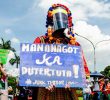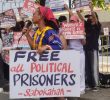DAVAO CITY, Philippines — Drug rehabilitation efforts are seen as successful here, but police data still shows a high number of drug-related apprehensions.
Davao City Anti-Drug Abuse Council (CADAC) said their Tabangan Atong Reformist Aron Naa’y Asenso (Tara Na!), a community-based rehabilitation and aftercare program (CBRAP) has been ‘qualitatively successful’ in its three years operation in helping drug reformist to quit illegal drug activities.
Connie Domag, the Technical Adviser on Drug Prevention and Rehabilitation of the CADAC, said they based their findings on the individual assessment result of a reformist who successfully finished the program.
“I generally say that the program is on the successful side. So far we have batches that have finished the phase 1 and phase 2 of our program” said Domag.
In its Phase 1 rehabilitation, Domag said there are at least 1,500 individuals who have finished the 6 months Intensive Care program, but only recently 57 drug reformists from Barangay Sirib have finished the 18 months Phase 2-After Care program.
Domag explained that CADAC recorded more than 11,000 individuals who surrendered to the Davao City Police Office since 2017. Currently, there are only 4,444 individual who are now enrolled with the Tara Na!- CBRAP under its three-phased component.
“Although the figure is small compared to the number of personalities who voluntarily surrendered, we are looking at the quality of life that they have now” she added.
Despite the efforts to eradicate the drug problem in Davao City, the authorities have recorded a high number of apprehensions of drug-related activities.
In a data provided by Davao City Police Office (DCPO) Spokesperson Police Capt. Ma. Teresita Gaspan, there are 1,661 individuals apprehended for drug-related cases from December 5, 2017, to July 9, 2019, compared to its 1,365 conducted police operation.
Gaspan identified two factors to consider such as the number of individuals who quit the program under CADAC and went back to their illegal activities. Another is the inactive coordination of local officials in the Barangay level to combat drugs in their community.
DCPO pointed out that most drug-related apprehensions are recorded in the ‘Poblacion area’ of Davao City.
“Some apprehended suspects surrendered during the Oplan Tokhang Operation but instead of undergoing the program, they tend to relapse and return to their illegal activities,” she said.
Domag also said, despite the Duterte administration’s strong campaign against illegal drugs there are communities in the City that are inactive in anti-drug programs.
In its record, there are still 29 barangays in the City that have not fully implemented the program. (davaotoday.com)










